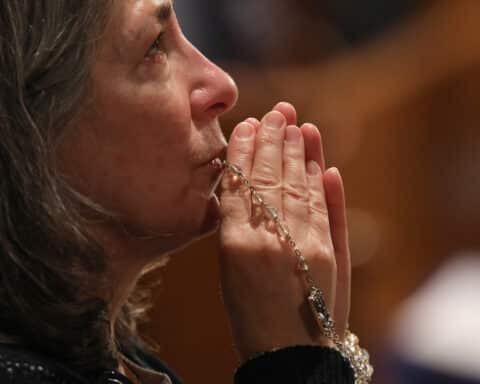
Friends, what are the readings for this Sunday about? They are an apocalypse of mighty signs and blazing fires as we approach the feast of Christ the King.
| November 13 — Thirty-third Sunday in Ordinary Time |
|---|
|
Mal 3: 19-20a |
Apocalyptic literature, just like the Wisdom literature we read several weeks ago, is a particular genre of biblical writing. Apocalyptic literature has its own characteristics, all of which suggest a certain transcendent way of approaching time and history as a mystery. The past, present and future are held together and transcended by God’s creative and redeeming activity. Looking back in hope, the powerful effect of God’s love upon our history can be discerned. In turn, our vision of the future forms: We can be made new, healed by the Sun of Justice. Again, in turn, a new vision of things here and now develops. We look for the work of God’s love unfolding around us. Apocalyptic literature thus primarily contains a message of hope, offering its readers a vision of all things that transcends the history we live.
The readings for this Sunday follow suit: They turn us in hope toward Christ, our King — our Sun of Justice. We await him. And he is coming. The readings for this Sunday tell us eight times that he comes and is coming! We rejoice in this fact by singing the responsorial psalm.
This waiting and this coming are very much part of our history today. The Old Testament tells us how Israel waited. And how God had come, even into the wilderness, in a tabernacle (cf. Ex 40). The Scriptures tell us how we all waited. And God came, “tabernacling” himself amongst us in Christ (cf. Jn 1:14). And still, we are waiting: next week is the feast of Christ the King; in two weeks, Advent begins. And yet, the Sun of Justice has risen. He comes to us daily in the Eucharist.
All of our waiting and all of God’s coming help us see how God’s love transcends time. Seeing this, we encounter the importance of Christ’s encouragement: persevere. Remember the past and live this memory of love out each day. Receive this memory in the Eucharist. Let it form you and guide you. Let God make you a new sign of hope for today.
That might sound poetic and nice. But in reality, in our lived experience, it is never so easy. It is never, never painless. I am reminded of a scene in C.S. Lewis‘ “Voyage of the Dawn Treader.” The young boy, Eustace, is annoyingly proud. So much so that he actually becomes like a dragon, complete with scaly skin and fiery breath. In order to become a “new creation,” Eustace must let the mighty lion, Aslan, who represents Christ, peel his dragon skin off layer by layer with his mighty lion claws. It is not easy or painless. In the idiom of today’s readings, we are only healed by the rays of the Sun of Justice. We are “tried by fire” and made new.
And so, the final word of our apocalyptic texts is to persevere. To persevere does not simply mean to endure the historical happenings of our time and place. To persevere, rather, means to endure in love of God and neighbor. It means to ourselves be apocalyptic, our pride burned to stubble by the memory of God’s love, and our heads raised to the Sun of Justice in hope, waiting. He is coming.
Catherine Cavadini, Ph.D., is the assistant chair of the University of Notre Dame’s Department of Theology and director of its master’s program in theology.





